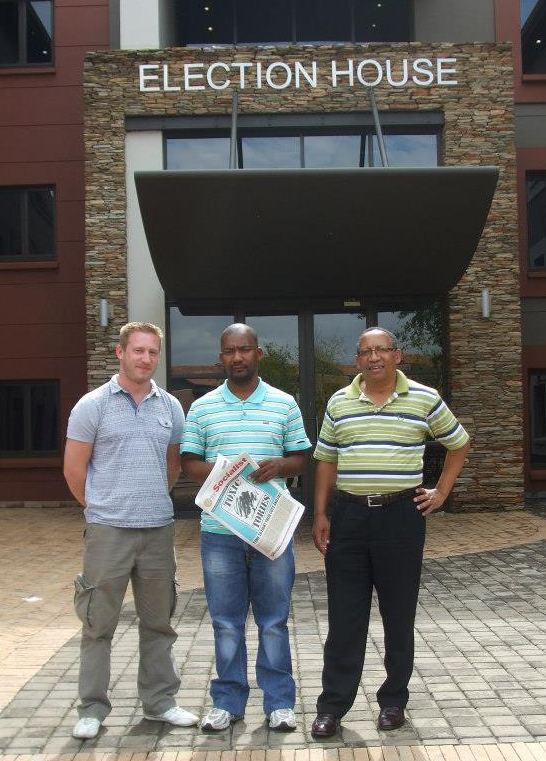First steps toward uniting struggles
Liv Shange, DSM South Africa
Workers and Socialist Party Registers at the Electorial Commission in South Africa, photo by S Figg (Click to enlarge: opens in new window)
Following the launch of the new Workers and Socialist Party (WASP) on 21 March, work is continuing to complete the formal registration of the party and establish its structures across South Africa.
The main focus is now on a campaign for real jobs, real wages and decent working conditions for the hundreds of thousands of workers who are exploited as ‘volunteers’ in the public sector.
This campaign is linked to the struggle for the most basic of public services in working class areas, such as electricity and housing, as well as the mineworkers’ demands for a living wage and against shaft closures.
Democratic Socialist Movement (DSM – the Socialist Party’s sister organisation in South Africa) and mineworker activists, are building WASP through such protests in, for example, the mining communities outside Johannesburg and in Limpopo.
On May Day (1 May), WASP is holding a rally in Carletonville, the gold mining town south of Johannesburg, aimed at tying all these campaigns to the need for nationalisation, under democratic control by workers and their communities, of the mining industry.
The African National Congress (ANC) government is using the most downtrodden as cheap labour, against a background of mass unemployment, in various ventures such as the Community Work Programme (CWP) and Home Based Care for as little as R500 (£35) a month in some cases.
These workers carry out extremely important work eg street maintenance, adult education, basic health care for the most needy,etc, which should be at the core of the public sector’s responsibilities.
Instead of carrying out these duties the government has reduced its intervention to an unholy mix of ‘charity’, super-exploitation, enrichment of parasitic labour broking firms and corruption.
Instead of creating real jobs to fulfil the real needs of the communities, in many cases, government departments hand out tenders to profit-driven labour brokers who then supply ‘volunteers’ ‘to make a contribution’ and gain work experience while getting paid a pittance if anything at all.
WASP is working on bringing together the workers of the CWP throughout Gauteng province in a unified workers’ committee.
Mass protests
Meanwhile, working class communities are crying out for the means to meet the bare necessities of life.
In Wedela township, a stone’s throw away from the gold-mining giants’ deep shafts, the ANC-led council has in recent months cut off the electricity to hundreds of people who cannot pay the ever-increasing prices.
This was bound to provoke mass protests; especially as it came only months after the mineworkers’ strike movement of last year, and weeks after the united workers’ and community struggle against Harmony Gold’s lock-out and eviction of 6,000 workers.
The building of WASP is part of the agenda for the mostly young activists who are leading ‘Operation Khanyisa’ (‘Operation Switch On Light’) and protest marches.
While the workers and unemployed are forced to search for firewood in the bushes and collect water from streams, contaminated by the mines’ spillage, these monopolies are making billion-dollar profits.
Still, jobs on the mines are in jeopardy. By July, 14,000 mineworkers in Rustenburg could be unemployed if the world’s largest platinum producer Anglo Platinum has its way and pushes through a ‘restructuring’ to rescue its profit margins.
If carried through, it could unleash further attacks from other mining companies, eg in gold mining where, like platinum, prices are also falling.
For the capitalists, these are, however, temporary measures – at the workers’ expense. In the longer term, the mining barons are not worried – knowing that they own the world’s largest mineral deposits at an estimated value of at least $2.5 trillion.
The real danger for them lies elsewhere, in the likelihood of the renewed flaring up of conflict with the mineworkers.
The ANC government has made its stance clear – nationalisation was overwhelmingly rejected by the latest ANC congress in December, and President Jacob Zuma has declared ‘violent protest’ the state’s first priority when it comes to ‘combatting crime’.
Meanwhile, the trade union federation Cosatu, in alliance with the ANC, is torn by more and more violent factional tensions.
The need to build WASP and the independent workers’ committees could not be more urgent.
In a race against time, the DSM is working hard to establish WASP and unite the many workers’ and community struggles.
There is now the beginning of WASP structures in all nine provinces, with openings among several important groups of workers, for example in the municipal and transport sectors.
Hopefully May Day can be the starting point for a nationwide campaign for decent work and pay, housing, electricity and other basic services and for the nationalisation of the mining industry.








